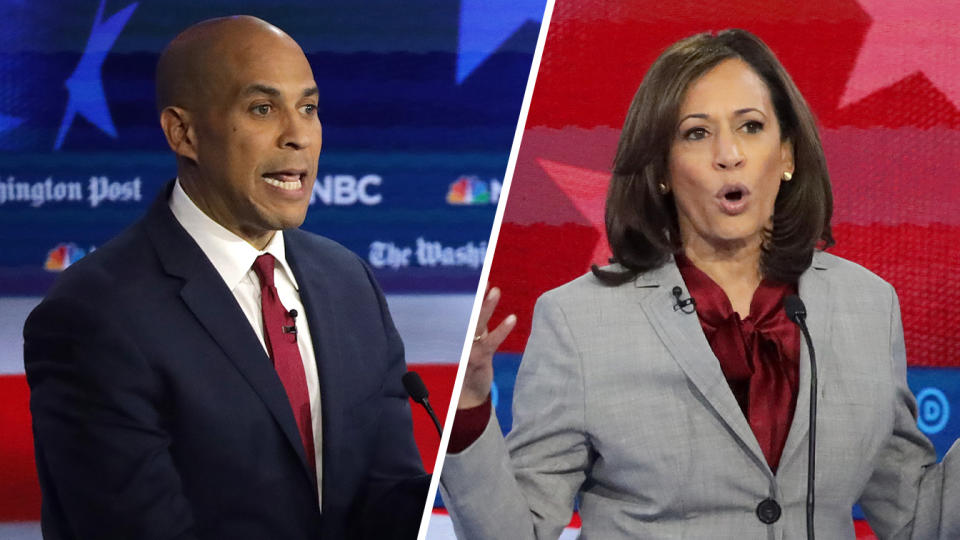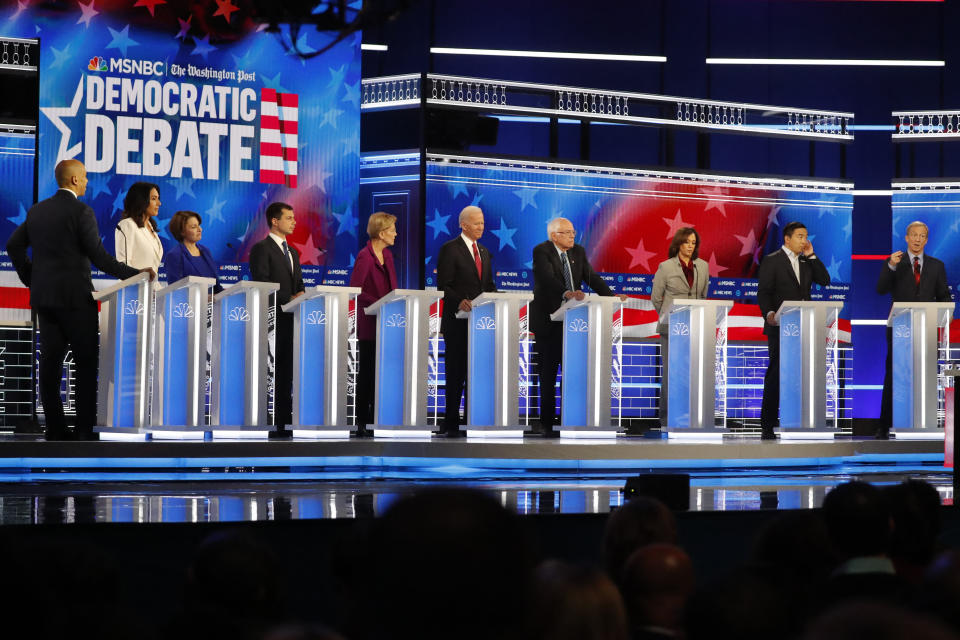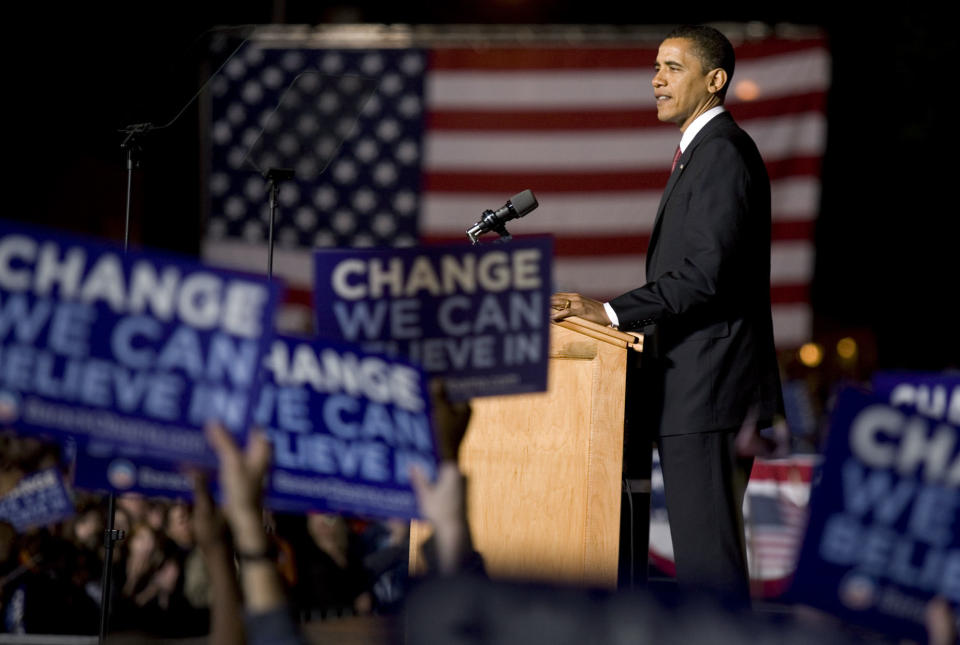Booker and Harris warn Dems: Electability doesn't just mean appealing to white voters
Welcome to 2020 Vision, the Yahoo News column covering the presidential race with one key takeaway every weekday and a wrap-up each weekend. Reminder: There are 74 days until the Iowa caucuses and 348 days until the 2020 election.
Electability is the biggest buzzword of the 2020 cycle. In poll after poll, it’s what Democrats say they prize above all else: a nominee who can defeat Donald Trump.
But electability is also a code word. As typically construed by pundits, voters and politicians themselves, it tends to mask a racialized assumption about which Americans a candidate needs to win over in order to qualify as “electable”: that is, white voters who don’t live in big coastal cities.
At Wednesday’s Democratic debate, the remaining black candidates in the race, Sens. Cory Booker and Kamala Harris, argued for the first time on the national stage that electability actually goes the other way, too, and that defining it solely as “white working-class appeal” could doom the Democratic Party next November.
“The issue has to be, how are we going to win?” Harris said. “And to win, we have to … rebuild the Obama coalition.”
“Black voters are pissed off, and they’re worried,” Booker added. “They’re pissed off because the only time our issues seem to be really paid attention to by politicians is when people are looking for their vote. And they’re worried because the Democratic Party — we don’t want to see people miss this opportunity and lose because we are nominating someone that … isn’t trusted [and] doesn’t have [an] authentic connection.”

“We lost the last election,” Booker concluded. “We need to have someone that can inspire, as Kamala said — to inspire African-Americans to the polls in record numbers.”
Harris and Booker have a point.
The back-and-forth Wednesday night was brief, and the deeper reason it came up went largely unexamined — even though the debate was taking place at the studio of black media mogul Tyler Perry in the black mecca of Atlanta. Right now, the entire top tier of the Democratic primary field — Joe Biden, Elizabeth Warren, Bernie Sanders and Pete Buttigieg — is white. The nonwhite candidates — Booker, Harris, Julián Castro, Andrew Yang and Tulsi Gabbard — have languished in the single digits. And except for Biden, a familiar face who was chosen as running mate by America’s first black president, the frontrunners have struggled to connect with black voters.

Buttigieg has had the hardest struggle. While his polling numbers have been skyrocketing in overwhelmingly white Iowa and New Hampshire, his support among black voters in South Carolina currently stands at zero percent. Nationally, Buttigieg’s black support tops out at around 5 percent. And only six current or former black or Latino officials have endorsed him. The South Bend, Ind., mayor’s official explanation is that “black voters in America … don’t yet know me,” as he put it during Wednesday’s debate. But that getting-to-know-you process has also been hampered by a series of missteps on Buttigieg’s part: Racial controversies have rocked South Bend on his watch, and, in South Carolina, his campaign recently promoted his “Douglass Plan” for African-Americans with a stock photo of a Kenyan woman and a misleading list of 400 supporters, 62 percent of whom turned out to be white and many of whom did not even agree to be included. Also problematic was the leak last month of an internal campaign memo essentially blaming Buttigieg’s troubles with black voters on homophobia. (Buttigieg, 37, is a married gay man.)
Warren and Sanders are doing better, but not by much. A recent Economist/YouGov poll found Biden at 47 percent among black voters; Warren and Sanders were both at 12 percent.
Typically, the punditry about Buttigieg’s, Warren’s and Sanders’s relative lack of appeal to black Americans focuses narrowly on the Democratic primary contest: Black voters are the party’s most loyal constituency, with a huge presence in South Carolina and many other primary states, so all of these candidates are at a big disadvantage relative to Biden.
But the point Harris and Booker were making Wednesday is broader than that. Some Democrat is going to secure the party’s nomination. But if he or she doesn’t “inspire African-Americans to the polls in record numbers,” as Booker said during the debate, Trump could be reelected.
History, it turns out, is on their side. According to the Census Bureau’s Current Population Survey, 65 percent of white citizens cast ballots in the 2016 presidential election, up from 64 percent four years earlier. But the turnout rate among African-American citizens tumbled sharply, with only 59 percent of black citizens voting in 2016, down from 66 percent in 2012 and 65 percent in 2008. Meanwhile, in Michigan and Wisconsin — the two closely contested states that put Trump over the top — black turnout fell by more than 12 percentage points. According to a new study by the Center for American Progress, Democrats would flip the Trump states of Michigan, North Carolina, Pennsylvania and Wisconsin and win a 294-244 Electoral College majority in 2020 if African-American voting returns to its 2012 level.
That is easier said than done; black turnout in 2008 and 2012 presumably had a lot to do with the fact that the first African-American nominee was on the ballot. Obama also won more white working-class voters than Hillary Clinton did in 2016. But that’s what Booker and Harris were saying about the “Obama coalition”: the electability equation has two sides, and Democrats simply can’t afford to solve only one of them.

Recapturing the 2008-2012 magic doesn’t necessarily mean nominating Booker or Harris, who currently poll at 2 percent and 6 percent, respectively, among black voters in South Carolina. It doesn’t necessarily mean nominating Obama’s veep, who overlooked Harris Wednesday night while touting his support from “the only African-American woman that’s ever been elected to the United States Senate” (meaning former Sen. Carol Moseley Braun). (“No, that's not true,” Harris interjected, underscoring the latest in Biden’s long line of race-related flubs. “The other one is here.”) And it doesn’t necessarily mean putting Booker, Harris or Georgia’s Stacey Abrams — who was mentioned several times during the debate — in the running-mate slot to help boost black turnout, though that’s undoubtedly what some Democratic strategists are thinking.
What “rebuilding the Obama coalition” does mean is broadening the idea of electability to encompass more than the stereotypical white swing voter in Wisconsin. It means reaching out to the black voter in Wisconsin who stayed home last time too. Booker and Harris were right to deliver that warning during the debate — and the entire Democratic Party, from the candidates onstage to the voters on the ground, would be wise to listen.
_____
Download the Yahoo News app to customize your experience.
Read more from Yahoo News:
Rebuilding Paradise: A year after the Camp Fire, one couple finds healing in starting over
Key Democrat: House needs to 'keep this simple' in crafting impeachment articles
As Supreme Court weighs DACA, Trump pushes fiction about 'hardened criminals'
PHOTOS: 10 bronze statues of inspirational women in NYC by Statues for Equality"





